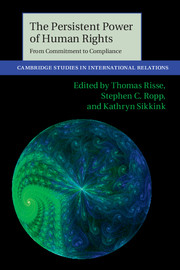Book contents
- Frontmatter
- Contents
- Figures
- Tables
- Contributors
- Preface
- Part I Introduction and stock-taking
- Part II Conceptual and methodological issues
- 4 Human rights in areas of limited statehood
- 5 The “compliance gap” and the efficacy of international human rights institutions
- 6 Social mechanisms to promote international human rights
- Part III From ratification to compliance
- Part IV From commitment to compliance
- References
- Index
4 - Human rights in areas of limited statehood
The new agenda
Published online by Cambridge University Press: 05 March 2013
- Frontmatter
- Contents
- Figures
- Tables
- Contributors
- Preface
- Part I Introduction and stock-taking
- Part II Conceptual and methodological issues
- 4 Human rights in areas of limited statehood
- 5 The “compliance gap” and the efficacy of international human rights institutions
- 6 Social mechanisms to promote international human rights
- Part III From ratification to compliance
- Part IV From commitment to compliance
- References
- Index
Summary
The Power of Human Rights (PoHR; Risse et al. 1999) developed a spiral model of human rights change that started from four implicit and interrelated assumptions:
Human rights-violating states are consolidated states that enjoy both the monopoly over the means of violence and the ability to make and fully implement central political decisions.
Illiberal regimes violate human rights intentionally, that is, because they want to, not because they lack the capacity to comply with international norms.
Rights-violating perpetrators are state actors for the most part.
(Transnational) non-state actors promote compliance with international human rights by pressuring state actors towards norm adoption and implementation and by socializing them into the new norms, respectively.
These assumptions are valid for the cases discussed in PoHR and beyond (see Chapter 2). But they do not fit “areas of limited statehood,” i.e. territorial or functional spaces in which national governments do not control the means of violence and/or are incapable to implement or enforce central decisions including the law. We argue in the following that consolidated statehood forms the exception rather than the rule in the contemporary international system and that “areas of limited statehood” are more widespread than is commonly assumed (see Risse 2011b; Risse and Lehmkuhl 2007). In particular, areas of limited statehood are not confined to fragile, failing or failed states, but characterize most developing countries in the current world system.
- Type
- Chapter
- Information
- The Persistent Power of Human RightsFrom Commitment to Compliance, pp. 63 - 84Publisher: Cambridge University PressPrint publication year: 2013
- 13
- Cited by



